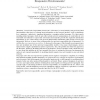Free Online Productivity Tools
i2Speak
i2Symbol
i2OCR
iTex2Img
iWeb2Print
iWeb2Shot
i2Type
iPdf2Split
iPdf2Merge
i2Bopomofo
i2Arabic
i2Style
i2Image
i2PDF
iLatex2Rtf
Sci2ools
IACR
2016
2016
Universal Composition with Responsive Environments
In universal composability frameworks, adversaries (or environments) and protocols/ideal functionalities often have to exchange meta-information on the network interface, such as algorithms, keys, signatures, ciphertexts, signaling information, corruption-related messages. For these purely modeling-related messages, which do not reflect actual network communication, it would often be very reasonable and natural to expect that adversaries/environments provide the requested information immediately or give control back to the protocol/functionality immediately after having received some information. However, in none of the existing models for universal composability this is guaranteed. We call this the non-responsiveness problem. As discussed in the paper, while formally non-responsiveness does not invalidate any of the universal composability models, it has many disadvantages, such as unnecessarily complex specifications and less expressivity. Also, this problem has often been ignored ...
Biometrics | IACR 2016 |
Related Content
| Added | 03 Apr 2016 |
| Updated | 03 Apr 2016 |
| Type | Journal |
| Year | 2016 |
| Where | IACR |
| Authors | Jan Camenisch, Robert R. Enderlein, Stephan Krenn, Ralf Küsters, Daniel Rausch 0001 |
Comments (0)

